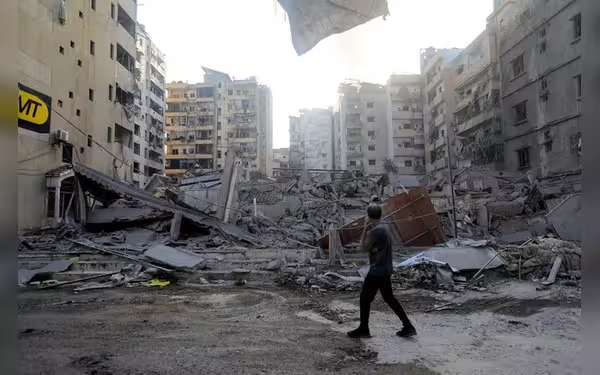Saturday, November 16, 2024 05:52 PM
UN Refugee Chief Condemns Airstrikes in Lebanon for Violating Humanitarian Law
- UN refugee chief highlights civilian casualties in Lebanon airstrikes.
- Over 1.2 million displaced due to intensified military operations.
- Call for immediate cessation of hostilities in Lebanon and Gaza.
 Image Credits: thefrontierpost
Image Credits: thefrontierpostUN refugee chief Filippo Grandi condemns airstrikes in Lebanon, highlighting civilian casualties and violations of humanitarian law.
The ongoing conflict in Lebanon has escalated significantly, drawing international attention and concern. Recently, the United Nations’ refugee chief, Filippo Grandi, raised alarms regarding the airstrikes conducted in Lebanon, particularly those attributed to Israel. Grandi emphasized that these airstrikes have not only targeted military objectives but have also struck civilian infrastructure, leading to tragic loss of life and widespread destruction. This situation has raised serious questions about adherence to international humanitarian law, which is designed to protect civilians during armed conflicts.
During his visit to Beirut, Grandi highlighted the dire humanitarian situation in Lebanon, where over 1.2 million people have been displaced due to the intensified Israeli military operations. These operations are reportedly aimed at Iran-backed Hezbollah, but the consequences have been devastating for ordinary civilians. Grandi stated, "Unfortunately, many instances of violations of international humanitarian law in the way the airstrikes are conducted that have destroyed or damaged civilian infrastructure, have killed civilians, have impacted humanitarian operations." This statement underscores the urgent need for all parties involved to reassess their military strategies and prioritize the safety of civilians.
According to the Lebanese health ministry, the conflict has resulted in more than 2,000 deaths and nearly 10,000 injuries, with the majority occurring in the last two weeks. In contrast, Israel claims that around 50 of its civilians and soldiers have lost their lives. The Israeli government maintains that its military actions are focused on neutralizing threats and that it takes measures to minimize civilian casualties. However, Lebanese authorities argue that civilians are being deliberately targeted, creating a complex and tragic narrative of the conflict.
Grandi also pointed out that the World Health Organization has reported severe violations of international humanitarian law, particularly concerning health facilities in Lebanon. He noted that attacks on civilian homes could also constitute violations, although further investigation is necessary to fully understand the extent of these actions. The humanitarian crisis has prompted a significant number of people—approximately 220,000—to flee across the Lebanese border into Syria, with a mix of Syrian and Lebanese nationals among them.
As the situation continues to unfold, Grandi called for an immediate cessation of hostilities, urging all parties involved to "stop this carnage that is happening both in Gaza and in Lebanon today." The international community must pay close attention to these developments, as the humanitarian implications are profound. The conflict not only affects those directly involved but also has far-reaching consequences for regional stability and global peace.
The ongoing airstrikes in Lebanon serve as a stark reminder of the devastating impact of war on innocent lives. As the world watches, it is crucial for all stakeholders to prioritize humanitarian principles and work towards a peaceful resolution. The safety and dignity of civilians must be at the forefront of any military strategy, and it is imperative that the voices of those affected are heard and respected. Only through collective action and a commitment to international law can we hope to alleviate the suffering and pave the way for a more peaceful future.













